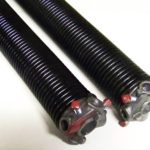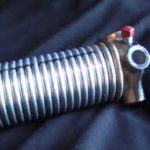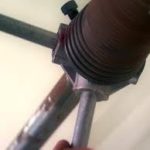For the sake of argument, let us assume it’s time for garage door torsion spring replacement. You will be given two choices: galvanized & oil tempered springs. Which one will you choose? Without knowing the differences between the two garage door springs, you might find it difficult to select. After all, a torsion spring is just a torsion spring to you. Right? Wrong. Although they are both installed to do the same job, there are differences between them.
And since the garage door torsion spring is a very, very important part of the system, don’t take your decision lightheartedly. You need to know the pros and cons to take informed decisions and never choose randomly. But let us start with the basics.
What is the oil-tempered torsion spring?
Oil-tempered torsion springs are what we call the classic make for garage  doors. They have been on the market for a very long time and are the torsion springs most garage doors utilize. Their name derives from the way they are made. The wire which is used to make the spring is heated, quenched in oil, and then heated again. This is known as the oil tempering process.
doors. They have been on the market for a very long time and are the torsion springs most garage doors utilize. Their name derives from the way they are made. The wire which is used to make the spring is heated, quenched in oil, and then heated again. This is known as the oil tempering process.
What is the galvanized torsion springs?
 Galvanized torsion springs are made in a different way. They undergo a hot-dip galvanization process during which the spring wire is zinc coated. These types of springs haven’t been on the market as long as their oil-tempered counterparts and although they were broadly welcomed at first, they are now options for specific applications.
Galvanized torsion springs are made in a different way. They undergo a hot-dip galvanization process during which the spring wire is zinc coated. These types of springs haven’t been on the market as long as their oil-tempered counterparts and although they were broadly welcomed at first, they are now options for specific applications.
Galvanized vs oil-tempered torsion springs
One of the disadvantages of oil-tempered springs is that they leave smudges. Harmless but made people angry, especially if they had a pro coming in for torsion spring repair and had to clean the area afterwards. This was actually the main reason why galvanized torsion springs became popular when first placed on the market. But people soon realized that zinc galvanized springs lacked the advantages of the classic type and made a strong comeback to the traditional oil tempered spring. Let’s see why.
The pros & cons of galvanized torsion springs
- They are attractive and shiny and that’s important when you want to keep the garage tidy or transform it into a livable space.
- They leave no smudge behind. And this reduces the mess during torsion spring replacement and repair services.
- Due to the zinc coating, these springs are resistant to moisture and thus corrosion. And so they are the best solutions in environments where humidity is an issue.
The drawbacks?
- Galvanized torsion spring adjustment is needed approximately every 6
 months. That’s because they lose tension easily. And that’s not good for the springs, which tend to wear faster when adjusted often.
months. That’s because they lose tension easily. And that’s not good for the springs, which tend to wear faster when adjusted often. - And this brings us to the second problem. Since galvanized springs wear faster, they become noisy rather fast too.
The pros & cons of oil tempered torsion springs
- The process of oil tempering gives extra strength to these springs. They are extremely durable and thus last for many years.
- Oil-tempered springs don’t lose easily their tension and so they hardly ever need adjustments.
- They are more affordable than their counterparts and found easily.
The drawbacks?
- The oil tempering process makes them dirty and so any garage door spring repair will create a mess. If you touch them, your hands will get filthy due to the residue they leave behind.
- Their appearance is no good. They look dirty and so they are not the right option to those seeking aesthetic solutions.
- Rust can built-up unless you lubricate them regularly. And so they are not the right solution for wet environments.
How to choose garage door springs?
In order to choose between galvanized and oil tempered torsion springs, consider your needs and your environment. Don’t get galvanized springs if you want to avoid regular adjustments and like to keep the springs for years. But avoid oil tempered springs if your environment is humid or you give priority to aesthetics.






